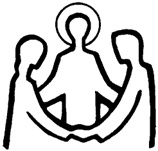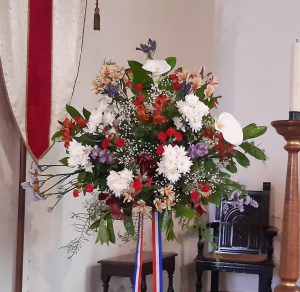Genesis 18:1-10a. Luke 10:28-42 
In the name of the Living God, loving Father, risen Son and ever present Holy Spirit. Amen
I am going to begin today by reading you a poem. It will be quite familiar when I read it. It is written by WH Davies and is called Leisure. The poet had an interesting life in the late 1800s and early 1900s including a time on the road (as a tramp), both in this country and America! In later life he had a much more settled existence:-
Leisure – WHAT is this life if, full of care, We have no time to stand and stare?
No time to stand beneath the boughs, And stare as long as sheep and cows:
No time to see, when woods we pass, Where squirrels hide their nuts in grass:
No time to see, in broad daylight, Streams full of stars, like skies at night:
No time to turn at Beauty’s glance, And watch her feet, how they can dance:
No time to wait till her mouth can enrich that smile her eyes began?
A poor life this if, full of care, We have no time to stand and stare.
When someone special is coming to your house, we like to make lots of preparations. What kind of things would we do? Make a cake, Do the hoovering. Tidy up a bit. Get out the best china. Brush the cats (and then hoover again). Clean the bathrooms etc. Put on some nice clothes.
I want to tell you a story now that connects to expecting special visitors and listening to each other. It is all about a child called Jo and his family, and if you sitting comfortably I shall begin
It was very noisy and confusing at Jo’s house. His mum was in a flap because her Italian relatives were coming. She was running around the house issuing commands as well as doing lots of stuff simultaneously. jo’s dad was heroically trying to finish all those DIY jobs that he had started but never finished as well as mowing the lawn. The washing machine and dishwasher were on and Jo was being made to tidy his room, have a bath and put on his best set of clothes all at the same time – which was very confusing.
And then the phone rang. But in the noise it was only Jo who heard it. It was his cousin Giovanni phoning to say after a long wait at the airport, their flight had been cancelled. There was a problem with having enough flight crew and they hoped to fly instead tomorrow. He couldn’t speak for long as the call was costing a fortune and they would ring back when they knew more to make new arrangements.
Jo thought for a moment about what to do. First Jo ran downstairs to tell his mum, but she was putting the final touches to her baking, putting the washing away, ironing the tablecloth and setting the table. All at the same time – it was very confusing. She wouldn’t listen to him and told him to go and dust the living room. Jo gave up!
Next Jo tried really hard to tell his dad, but he was too busy trying to hang a picture, trying to fix a leaking tap, trying to get the bathroom door lock to work, mowing the lawn and washing the car. It was all very confusing. And his dad told him to go away too and tell his mother whatever it was. Jo gave up!
Later that day when everyone had finished their chores, the picture was up, the tap was not leaking, the bathroom door locked, the lawn was mowed and the car was gleaming. The table was laid with magnificent baking in pride of place, and the washing was put away and the dusting was done. Even Jo was squeaky clean, in his best clothes and his room was tidy, they all sat down.
It was then that Jo’s mum remembered that he had been trying to tell her something. What was it you wanted to say Jo? Mum asked. And it was only then that Jo was able to tell her about the phone call
There was lots to regret at that point and lessons learnt about the importance of taking time to listen.
We can make preparations when we know someone special is coming. When someone special turns up unexpectedly. We cannot do all these things. We have to receive them as we are!! And offer them food and drink based on what we have available. In our gospel this morning, Martha and Mary were in this position. Someone VERY VERY special in the shape of Jesus turned up on their door step and they had to cope!!
They had 2 different reactions
-
Martha – rushed to get everything ready. She left others to talk with Jesus and tried to make up for all the things that couldn’t have been prepared as they did not know he was coming.
-
Mary – sat with Jesus and just listened.
If someone comes unexpectedly – hands up if you are more likely to respond like Martha or Mary. Let’s see.
It can be very confusing what to do. Jesus however is very clear that Mary’s way is best in this situation. That sometimes (like Jo’s parents) we have to stop and listen. Take time to be as that poem I started with encouraged us and not rush about like lemmings OR headless chickens, or making things more confusing by putting pressure on ourselves and making things too complicated. In our world taking time to be does not get the press it deserves. We often prize being too busy, over taking time to listen and think and be. If Jo’s mum and dad had listened to him, they would really have taken the pressure off themselves and all that confusion really wasn’t helping. Though it may have been great to have all those jobs done – they could have taken more time and had time for each other.
The same is true of Martha. Though Martha felt what she was doing was really really important, Jesus didn’t. He felt Martha just being with him would have been more important, as she might have been able to listen and make connections, and found herself more fully in his love and shake off some of her confusions.
Sometimes we use busyness to stop us from facing things we need to face too (if we are honest about it). I am going to finish with someone else’s thoughts – Elizabeth Whitehorn – on this passage
If Jesus suddenly knocked on my front door, how would I react?
I would bid him welcome, invite him to come in and make himself at home – of course I would!
No doubt I would also secretly wish he’d told me in advance, so that I could get ready, make the place tidy and prepare the food, so that I could focus on him, spend time with him.
So when Jesus comes to me in the midst of my everyday busyness, how do I react? when I’m not so preoccupied and hard-pressed?
Do I invite him in and then leave him alone, while I continue with what I was doing before?
Do I stop what I am doing and sit at his feet for a while but then make it clear that I have no more time?
Do I invite him to join me in my tasks and talk to him while we work alongside each other?
Do I keep the conversation polite and formal, fearing difficult personal questions?
If you think about it like this there is another question we might ask – How often do I not hear Jesus’ knocking on my door?
Elizabeth Whitehorn ends her thoughts with a prayer
Ever-present Jesus,
keep me from being too busy or too polite in my relationship with you or even too confused
When I am tempted to hide things away from you, help me to deal with them lovingly.
When I would rather avoid your difficult questions, help me to face them honestly.
When I am too busy to sit at your feet,
speak the quiet word that brings me to stillness. Amen
REFERENCES https://englishverse.com/poems/leisure . © ROOTS for Churches Ltd (www.rootsontheweb.com) 2002-2022. Reproduced with permission. Story adapted from https://www.rootsontheweb.com/lectionary/2010/48-july-august-2010-c/proper-11/open-the-word/story-too-distracted-to-listen. Reflection from https://www.rootsontheweb.com/lectionary/2004/12-july-august-2004-c/proper-11/explore-respond/reflection-too-busy-or-too-polite




